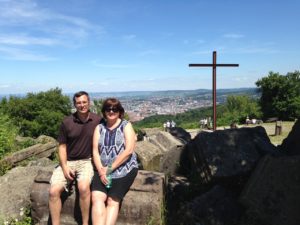Over the next few months we’ve invited folks from across Mennonite Church USA to reflect on our Journey Forward and consider how they’ve seen Renewed Commitments at work in their lives, their congregation or community. If you’d like to contribute to this series by highlighting stories that bring our shared values to life, email JenniferC@MennoniteUSA.org.
Terry Zehr grew up in northern New York State and has lived there most of his life. He is married to Lisa (30 years) with whom they raised three fine sons. Terry has been a pastor and conference leader for about 20 years in New York Mennonite Conference.
As I understand it, the Journey Forward Process is specifically designed to be “bottom up” where we hear the voice of the wider community to determine our future together. This has an Anabaptist flavor to it. Ours is a tradition that resists “top down” kinds of leadership. Perhaps a better term would be ambivalent.
As a church leader for the past 20 years, my experience is that we live in the messiness of a polity that affirms both the authority of good designated leadership and that of the wider communal voice. Managed well, this polarity is a component of healthy church life.
The leadership of the few always exists in tension with the voice of the gathered community to determine priorities and direction. Both are needed and, in some important ways, balance each other.
And yet, something in me still struggles with this whole thing. The church is not a democratic institution. We might rightfully be reluctant to grant high levels of authority for our church life to a very few persons. Perhaps all of us know stories about the abuse of authority in church history (I would note that there are plentiful stories of positive church leadership by Popes, Bishops, Pastors, etc.). However, adding more persons to decision-making is not necessarily the antidote. It might be safer from abuse, but it still does not rise to the level we are called to attain. The church is a benevolent monarchy (or a Theocracy), not a democracy. Jesus is our King.
Kingdom language is in vogue these days, but in a democracy such as ours, I wonder if we can truly grasp the implications of Kingdom. Our minds simply don’t work that way. When we consider our denominational priorities and direction for the future, the answer does not emerge through a small group wielding authority over the whole. Nor does it emerge through a democratic process where every voice is heard and accounted for.
Our priorities and direction for the future come from the King, whose Spirit is living and active. That Spirit speaks where it will and isn’t controlled by numbers. It emerges at the margins. Or it emerges in the center of our institutional life. It emerges through our most charismatic leaders. Or it emerges within the quietest, most broken person in our midst. This is my struggle.
I admit to questioning that a 67 percent majority vote is the truest signal of the Spirit’s work among us. At the same time, it’s difficult for me to hear the minority as the true voice for the Spirit. Further, what do I do with competing claims of what the Spirit of God is saying when it seems mediated by the conservative/progressive framework (which is a recent import and nowhere in scripture)? What is authentic discernment for what the Spirit of King Jesus is saying to his church? Where and how does this happen?
 In the Journey Forward process we declare that “we listen for God’s call as we read Scripture together, guided by the Spirit. Through baptism we commit ourselves to live faithfully as Jesus’ disciples, no matter the cost” (emphasis added). I affirm that sentiment with all my heart. I also affirm “We yearn to know and share in the mystery of God’s unending love.” It is this mystery that keeps me going. It is both a firm conviction and a plea of desperation.
In the Journey Forward process we declare that “we listen for God’s call as we read Scripture together, guided by the Spirit. Through baptism we commit ourselves to live faithfully as Jesus’ disciples, no matter the cost” (emphasis added). I affirm that sentiment with all my heart. I also affirm “We yearn to know and share in the mystery of God’s unending love.” It is this mystery that keeps me going. It is both a firm conviction and a plea of desperation.
God’s love is my only hope to finally be able to hear what the Spirit is saying to the church of Jesus who is King.
Admittedly, I’m still on the way with this whole thing. Yet my heart yearns to be deeply immersed in authentic Christian discernment even if it results in exacting a personal or corporate cost. Journey Forward tugs at both my hope and my skepticism. How does the corporate voice of Mennonite Church USA’s gathering at the Future Church Summit reflect the authentic voice of the Holy Spirit, calling us to costly discipleship immersed in the mystery of God’s unending love? Perhaps the only way to find that out is to live into our future together, not only trusting that God is leading us, but that God will also continue to correct and shape us, even if it hurts.
________________________________________________________________
All congregations are invited to use Journey Forward’s “Pathways” study guide. Find it and all Journey Forward updates here.
Your financial support of MC USA helps us equip leaders and tell stories of Anabaptist faith in action across the church. Donate to MC USA here.


